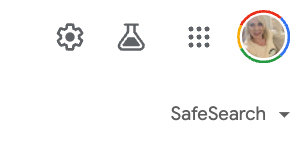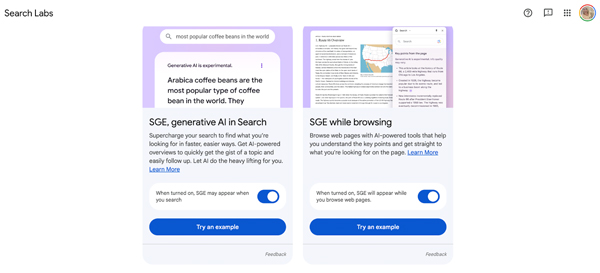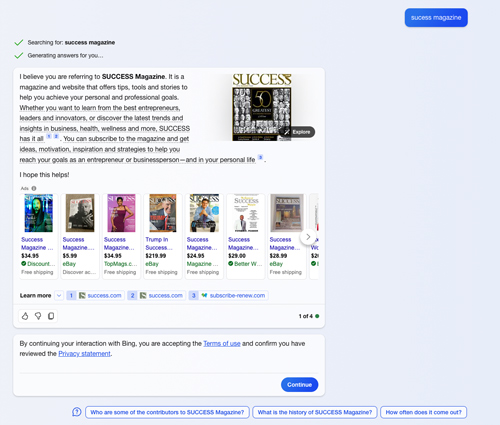Will Google Generative AI Search End the SEO Industry?

Imagine if you asked a search engine a question and actually got an answer instead of a list of links. You could get all the information you were looking for without having to dig through multiple websites for the answer. Well, that future is here.
Google has actually been testing their generative AI search since last May, but we’re hearing a lot more about it now. In November, Google added more elements to their generative AI search including a gift recommendation element and virtual try-on options for clothing.
In October, Texas A&M’s associate professor of information and operations management, Ravi Sen, wrote an article titled, “After 25 Years of Growth for the $68 Billion SEO Industry, Here’s How Google and Other Tech Firms Could Render It Extinct With AI.” Sen predicts generative AI search will kill the industry for small to midsize companies that rely on optimization to make money.
Sen’s opinion is not shared by all. Some SEO marketers predict generative AI search will change the industry but not kill it completely. Content marketer Julia McCoy posted a video posing the question, “Is SEO officially dead? Google’s AI in search.” If you search YouTube for “generative AI search and SEO,” there are countless videos espousing doomsday predictions or offering new ways to manipulate search engine algorithms.
What is search engine optimization?
SEO is a set of tactics marketers use to make websites more visible when their target audience searches for information relevant to their business. To understand search engine optimization, you must first understand how a search engine works.
Lumar has a very thorough guide explaining how search engines work, but here are the basics of what you need to know:
- Crawling: Search engines like Google crawl websites using a technology called a search engine bot or a spider. These crawlers visit billions of websites and follow links on each website to explore more websites.
- Indexing: The data discovered by the crawlers are added to an index that includes all the relevant URLs.
- Ranking: The search engine ranks all the websites it discovers using the keywords in the content, the type of content that is on the page, how recently the page was updated and how users have engaged with the websites in the past.
- Results: The ranked content is then displayed on the Search Engine Results Page, also known as the SERP.
How does SEO work?
SEO leverages knowledge of user behavior to ensure search results reach your target audience. Search engine users generally don’t want to sift through pages and pages of links. They want to get the answer to their question quickly. In fact, only 9% of users will scroll to the bottom of the first page of results. SEO in practice leverages this knowledge (and some tricks) to make sure your website is seen.
Since more than 80% of web searchers use Google over its counterparts—like Bing, Yahoo! and DuckDuckGo—most marketers and businesses optimize their content based on how Google ranks search results. And Google has gotten very good at showing users relevant content because its crawlers rank content based off of guidelines called E-E-A-T. These guidelines rank search results by expertise, experience, authoritativeness and trustworthiness. Additionally, Google ranks content based on technical factors such as user experience and page speed.
When optimizing a website, marketers use several different strategies that appeal to the delicate sensibilities of Google’s spiders to make websites rank.
What is generative AI in search?
Google and Microsoft are both piloting generative AI programs in search functions through Google Labs and Microsoft’s Bing. If you visit Bing’s website, you will immediately see the option to pose your question to a chatbot right below the search bar.

Google’s generative AI search is still in a pilot phase. In order to test it, you must first visit the Google Labs page by clicking the beaker icon on the top right-hand corner of your screen.

This will take you to Google Search Labs, where you can opt into Google’s Search Generative Experience.

IBM’s research blog defines generative AI as “deep-learning models that can generate high-quality text, images, and other content based on the data they were trained on.” But what does that mean, anyway? Generative AI uses patterns in data to produce content. For written content, it uses a process called Natural Language Processing (NLP).
NLP models are trained on large amounts of text and use these same types of predictions to spit out text consistent with what the model is asked for. ChatGPT and other large learning models use this process to “understand” the question being asked and then provide an answer.
So when I Googled “SUCCESS magazine” with SGE turned on, I received a response detailing the history of the publication as well as information about how to contact SUCCESS for a subscription.

Bing also provided a detailed response explaining what SUCCESS magazine is and what type of content to expect from the publication.

Why are search engine optimizers freaking out, and how can you future-proof your website?
Billy Wright is a senior SEO strategist at Direct Online Marketing. Wright states that many in the industry predict the SGE will lead to a 20%-75% drop in organic traffic for most websites.
This prediction makes sense: If Google is simply serving the answer to a user’s question, the user has no need to click through to a website to learn more about the answer to their question.
“Writing content purely to satisfy Q&A’s within the Rich Results on Google will likely stop bringing in traffic it once did as Google transitions to show its own answers within the generative results,” Wright explains. “Instead, there will need to be much more of a focus on building authority for your website and expanding out your product and location pages so that Google knows why to show you instead of your competitors.”
“If everyone is selling the same product or providing the same coverage of a news item, why should you appear instead of someone else?” he continues. “Building up authority on your website by telling Google who you are, why you’re an expert and how you became the top voice about a subject is going to be very important.”
The secret to staying relevant with Google generative AI search
Jesse Cunningham owns an SEO agency called 712 Digital and also has a YouTube channel that produces educational content about SEO. He also predicts business owners will need to produce more meaningful and relevant content.
“I’m encouraging business owners to prioritize content that provides relevance and information gain,” Cunningham says. “ I believe focus will shift to creating unique content with purposeful information gain. This means creating content that is optimized for SEO in the conventional sense as well as adding information that is hard for AI to replicate. In practice, this may look like a financial firm using internal data (anonymized) to provide statistics available nowhere else on the internet.”
You can also find a pretty thorough tutorial on Exposure Ninja’s YouTube channel with direct experience around ranking clients on SGE. But the most important thing to remember is that the AI world changes more frequently than you change your underwear—Google SGE is still in a testing mode and there could be significant changes to the model before releasing it to the public.
Photo by Nebojsa Tatomirov/Shutterstock.com



